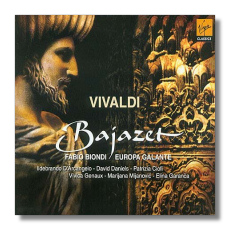
The Internet's Premier Classical Music Source
Related Links
- Vivaldi Reviews
- Latest Reviews
- More Reviews
-
By Composer
-
Collections
DVD & Blu-ray
Books
Concert Reviews
Articles/Interviews
Software
Audio
Search Amazon
Recommended Links
Site News
 CD Review
CD Review
Antonio Vivaldi

Bajazet, RV 703
- Ildebrando D'Arcangelo (Bajazet)
- David Daniels (Tamerlano)
- Patrizia Ciofi (Idaspe)
- Vivica Genaux (Irene)
- Marijana Mijanovic (Asteria)
- Elīna Garanča (Andronico)
Europa Galante/Fabio Biondi
Virgin Classics 5 45676-2 DDD 2CDs: 73:37, 72:49; Bonus DVD: 27min
Typical of its time, this is one of the operas with an "A loves B loves C, etc." plot, except the romantic entanglements take place against the backdrop of the conflict between Tamerlano (Tamerlane, literally "the lame lord"), ruler of the Tartars, and Bajazet (here, pronounced "Ba-zha-zette"), ruler of the Turks. This was a popular operatic subject in the 1700s, with at least 50 known settings. In brief, Tamerlano has conquered Bajazet, but desires the hand of Bajazet's daughter Asteria, even though he already has promised to marry Irene, princess of Trebisond. To solve the problem, Tamerlano simply pawns Irene off on Andronico, his Greek ally. Unfortunately, Andronico also loves Asteria. Irene shows up in disguise and adds to the confusion. Bajazet is furious at his daughter's apparent treachery, but she reveals her plot to stab Tamerlano on their wedding night. The plot is discovered, and father and daughter are jailed. Reduced to slavery, Asteria is about to poison Tamerlano while serving him, but Irene warns him in time. Tamerlano rewards Irene with a new promise of marriage, and orders Asteria, Bajazet, and Andronico to be taken away. Offstage, Bajazet poisons himself. Asteria returns to Tamerlano's presence begging for death as well. Instead, he has mercy on her, giving her (and the Greek throne) to Andronico, whom he forgives for his earlier attempts to intercede on Asteria's behalf. The opera ends with everyone (except Bajazet, of course) proclaiming how love has conquered hate.
Bajazet dates from 1735, when Venetian opera was losing a running battle with the mellower Neapolitan import. This is a pasticcio opera, which means that, in certain arias, Vivaldi used music by other composers – in this case, some associated with Neapolitan opera, such as Broschi, Hasse, and Giacomelli – and adapted it for his new opera. This was not at all unusual for the era, and it had a symbolic purpose, as Vivaldi used music by the composers in the Neapolitan style for arias assigned to the "invaders" – Tamerlano, Andronico, and Irene. Even so, the style is relatively homogeneous – perhaps too much so. (In other words, more stylistic contrast would have been welcome.) There is a short quartet to end Act Two, and the final tutti, but otherwise, all of the numbers are solos. Almost all of them are florid to some degree. This is not surprising, because Vivaldi wrote for the voice much as he wrote for the violin. The singers certainly are put through their paces. A few arias are missing from the original manuscript, and Biondi has carefully inserted suitable arias from other works to fill the gaps.
The lead characters sing more arias than the comprimarios, yet everyone is cruelly challenged by Vivaldi's writing at one point or another. Even Idaspe, who has a minor role as Andronico's confidant, is assigned one of those hair-raising "tempest at sea" arias of which the composer was fond. It is for that reason that it is difficult to single out just one or two of these singers for praise. This is a team effort. Although in principle I find it hard to swallow the idea of a countertenor as a fearsome Tartar conqueror, David Daniels's voice is a thing of beauty and great expressive power. Ildebrando D'Arcangelo is a manly and eloquent Bajazet, and Marijana Mijanovic is a stunner as his daughter. In the trouser role of Andronico, Elina Garan'a is very convincing in both masculine tenderness and fury. Ciofi raises goosebumps in her tempest aria. Perhaps the most astonishing singer to be heard here, however, is Vivica Genaux, who makes the impossible sound easy, and who handily encompasses the contradictions in the character of Irene. Fabio Biondi, conducting from the violin, leads a reading that is tough and exciting, and the musicians of Europa Galante make a heady noise.
As a bonus, Virgin Classics has included a DVD in which each of the principals is shown singing a complete aria during the 2004 recording sessions. (D'Arcangelo is allowed two arias, because his are short.) This DVD was a lot of fun, and makes a good teaser for the complete opera. It is worth the price of admission to see Genaux's lips moving so fast that they practically blur. Such are the demands that Vivaldi places upon his singers!
Copyright © 2005, Raymond Tuttle




















